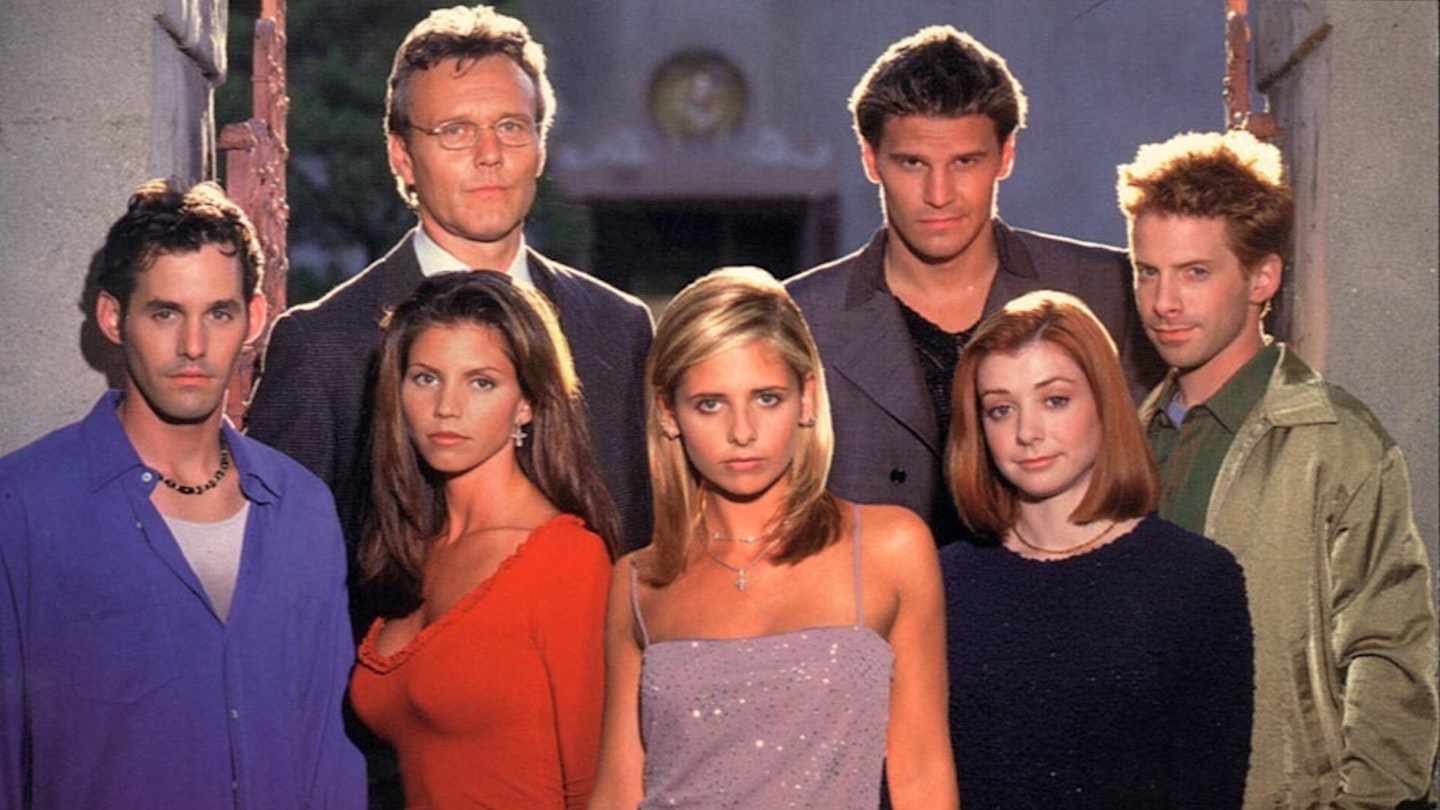As the TV version of Buffy The Vampire Slayer celebrates its 20th Anniversary, some may view its endurability with a bit of shock, but for Joss Whedon the entire “movement” has been part of a master plan. Merchandising, spin-offs, cult and mainstream appeal, critical acclaim — all of it was by design.
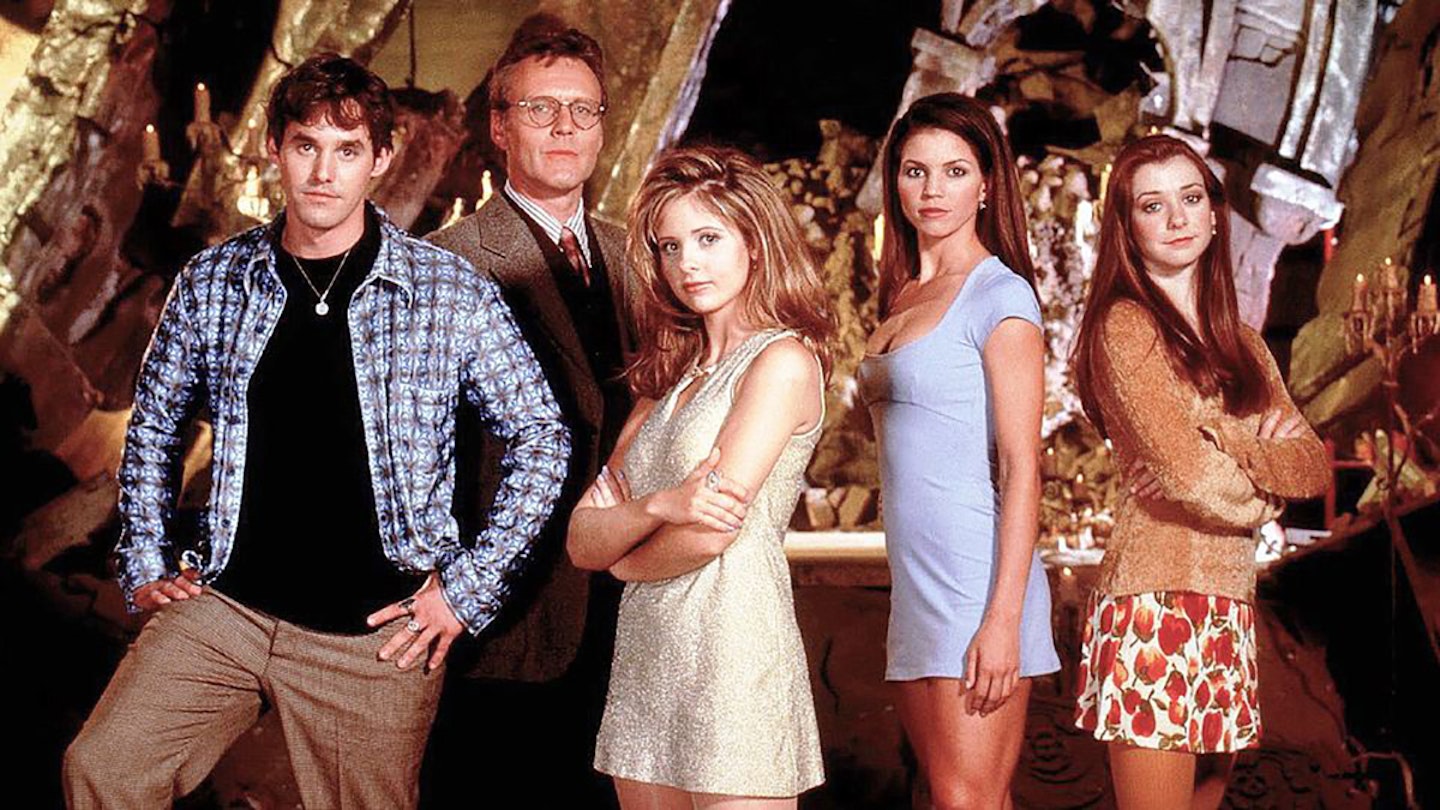
“I’ve said it before,” he insists, “I always intended for this to be a cultural phenomenon. That’s how I wrote it. In the back of my mind, I was always picking up an Oscar or a Saturn Award and everyone was playing with Buffy dolls.”
In the beginning — actually, July of 1992 — there was the Buffy the Vampire Slayer movie, which sucked — obviously not Whedon’s intention. It saw Kristy Swanson cast as high school cheerleader Buffy Summers, who is recruited to battle the undead. Although satisfied with his script, Whedon was incredibly disappointed with the final results, as directed by Fran Rubel Kuzui.
The film failed at the box office, which by Hollywood standards should have been the end of Buffy. But then came the phone call from the WB, a fledgling television network at the time that was attempting to stake out the young audience that had all but been abandoned by the other networks. The idea was to come up with programming with an edge, and Buffy The Vampire Slayer, despite its failure as a feature film, somehow seemed ideally suited to its needs. Made more so by a cast that includes Sarah Michelle Gellar (Buffy), Nicholas Brendon (Xander Harris), Alyson Hannigan (Willow Rosenberg), Charisma Carpenter (Cordelia Chase), Anthony Stewart Head (Rupert Giles) and David Boreanaz (the vampire, Angel).
Whedon looks back at Buffy's evolution.
Origin Story
In the mid-1980s, I’d gotten so tired of slasher film cliches, especially the dumb, oversexed blond stumbling into a dark place to have sex with a boyfriend, only to be killed. I began thinking that I would love to see a scene where a ditsy blond walks into a dark alley, a monster attacks her and she kicks its ass. After all those times the poor girl had sex and got herself killed for it, I just wanted her to be able to take care of herself. So I had this character before I had the idea of using vampires. I wanted to create a special person who desperately wants to fit in, but who has a higher calling. I decided to use vampires, because I’ve always thought vampires were cool.
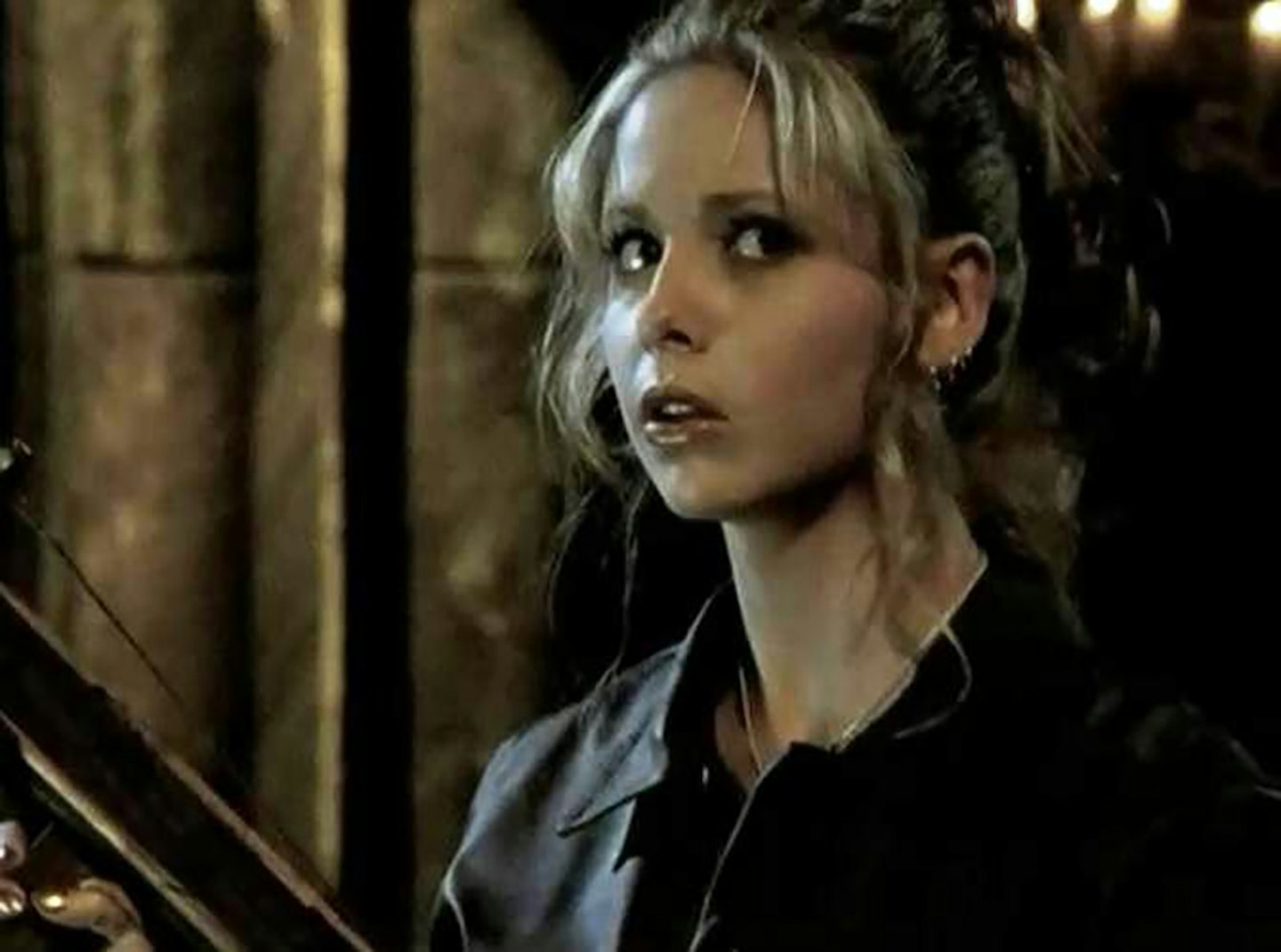
The idea of the movie is that Buffy is someone who is completely ignorant of the world, who was never expected to be anything except pretty — she’s nice, but self-centered and vacuous. Ultimately, she has to learn about vampires and such and becomes more mature as a result. The TV Buffy is dealing with the same stuff, but she’s already a Slayer and has been one for a while. She’s instinctively a hero, but at the same time she had to deal with the pain of adolescence. So her journey wasn’t quite the same. She was already empowered, but trying to deal with how that empowerment affects her. She accepts what she is, it’s now just a question of balancing her life as a Slayer and as a teenager.
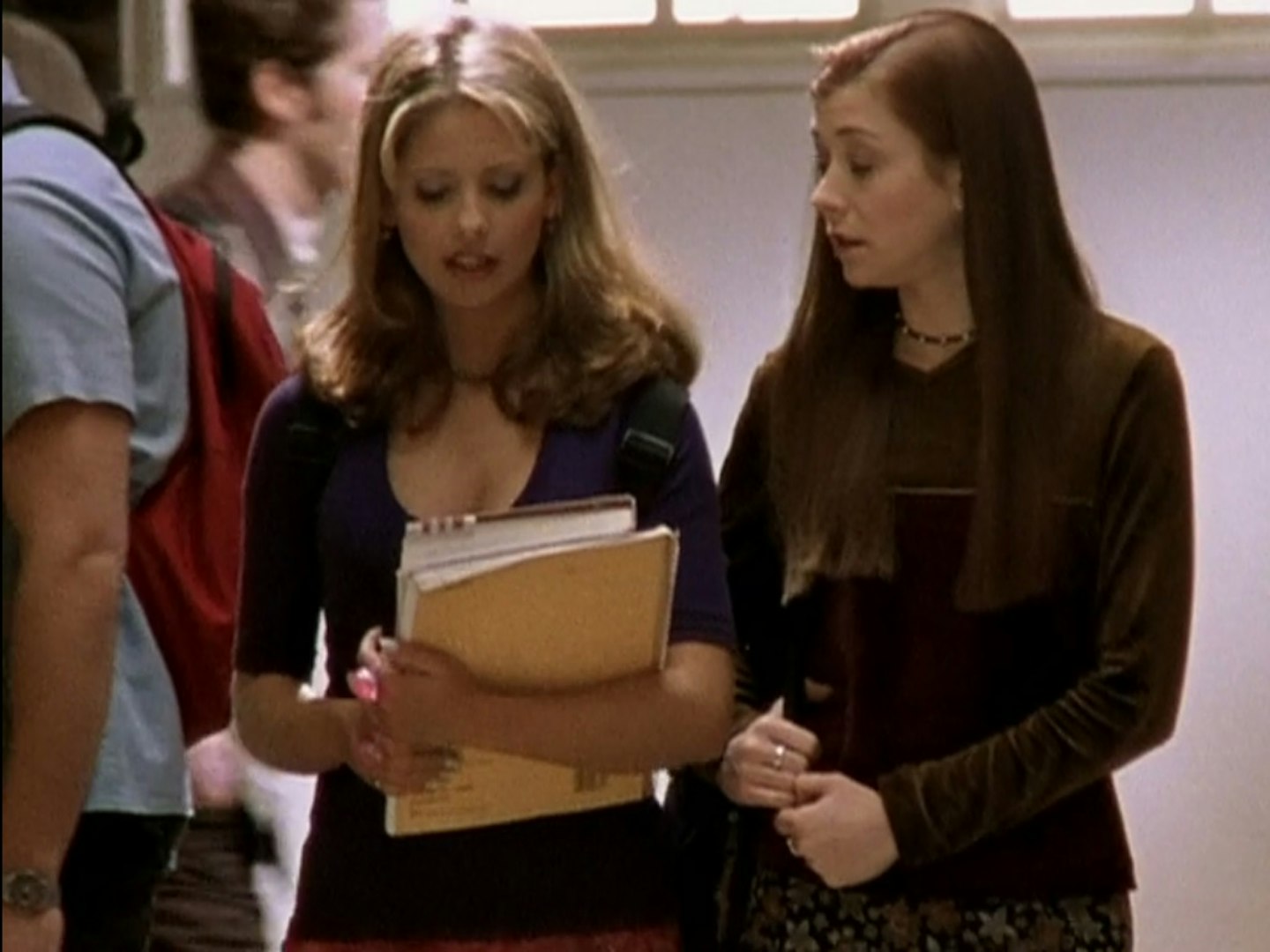
I think what’s really fun about Buffy is that our characters were constantly dealing with that particular balance. The humor in this came from Buffy thinking, “I have a math test coming up and I have a giant insect attacking me, and I have to deal with both of those realities.” They were also the only ones who knew what’s really going on. There were terrible things happening all the time — kids were dropping like flies at Sunnydale High — but everyone else was a little oblivious to what’s going on.
Buffy was the most manic-depressive show on television. It ping-ponged from, “Oh, it’s light ‘n fluffy” to “It’s Medea.” The show’s appeal was that it spoke so plainly to the high school experience, which is something you just don’t really ever get over. Everything’s bigger than life. In high school, my internal life was so huge and so dark and strange and overblown and dramatic, that this show seems kind of realistic in comparison. And we tried to talk with teenagers, not to them. Everything is so turgid when you’re in high school, everything is so powerful, so dramatic. I don’t think there is a time in life when you really feel that way except in high school. I’ve said, and I will say it until I’m in my grave, that high school is a horror movie and a soap opera, and I was trying to capture that in the show.
Seasons One Through Three
In season one, we found that we had a show that people liked. I really thought people were going to laugh at the Buffy/Angel thing and say, “Well, he’s a vampire. This is so hokey.” But they couldn’t get enough of it. It definitely made me realize the soap opera aspect of it; a continuing story of the romance and the people and their emotions was really what was fascinating. The monsters were all very well and good, but in the first season we were, like, “Let’s take our favorite horror movies and turn them into high school stories.” By the second season, the horror movies were gone and the horror came from the story, the high school and the emotion.
Season two was startling in its differences to the year before. The show took on the aforementioned serialized approach, at the heart of which was the storyline in which Buffy lost her virginity to Angel, who, as a result of a gypsy curse, lost his soul again and was transformed into pure evil personified by Angelus.
I think the Angelus arc really let the audience know that we were interested in change. That we were interested in shaking things up as much as possible and interested in just making things as grown up and complex as we could get away with. As it grew and the more we thought about it, the bigger it got until it became a really complex, adult kind of show.
Season three marked the end of high school for the characters and also introduced rebellious Slayer named Faith (Eliza Dushku). The “big bad” of the year was Mayor Wilkins, who’s made a deal with the Devil that would result in the destruction of Sunnydale and then, one would assume, the rest of the world. Victory was achieved, but that victory was bittersweet with Angel leaving Sunnydale (actually, for his own series).
Season two exceeded my expectations and season three was a struggle, because I was so happy with the year before. I was, like, “Can we do it again? Is the magic gone?” Which is good, because you keep working really hard. Year two got so personal and strange and it got heavier than I expected it could have. We really got to go there emotionally, mostly because we had actors who could do anything, which is something we didn’t know when we started. But I would say a couple of things about third season.
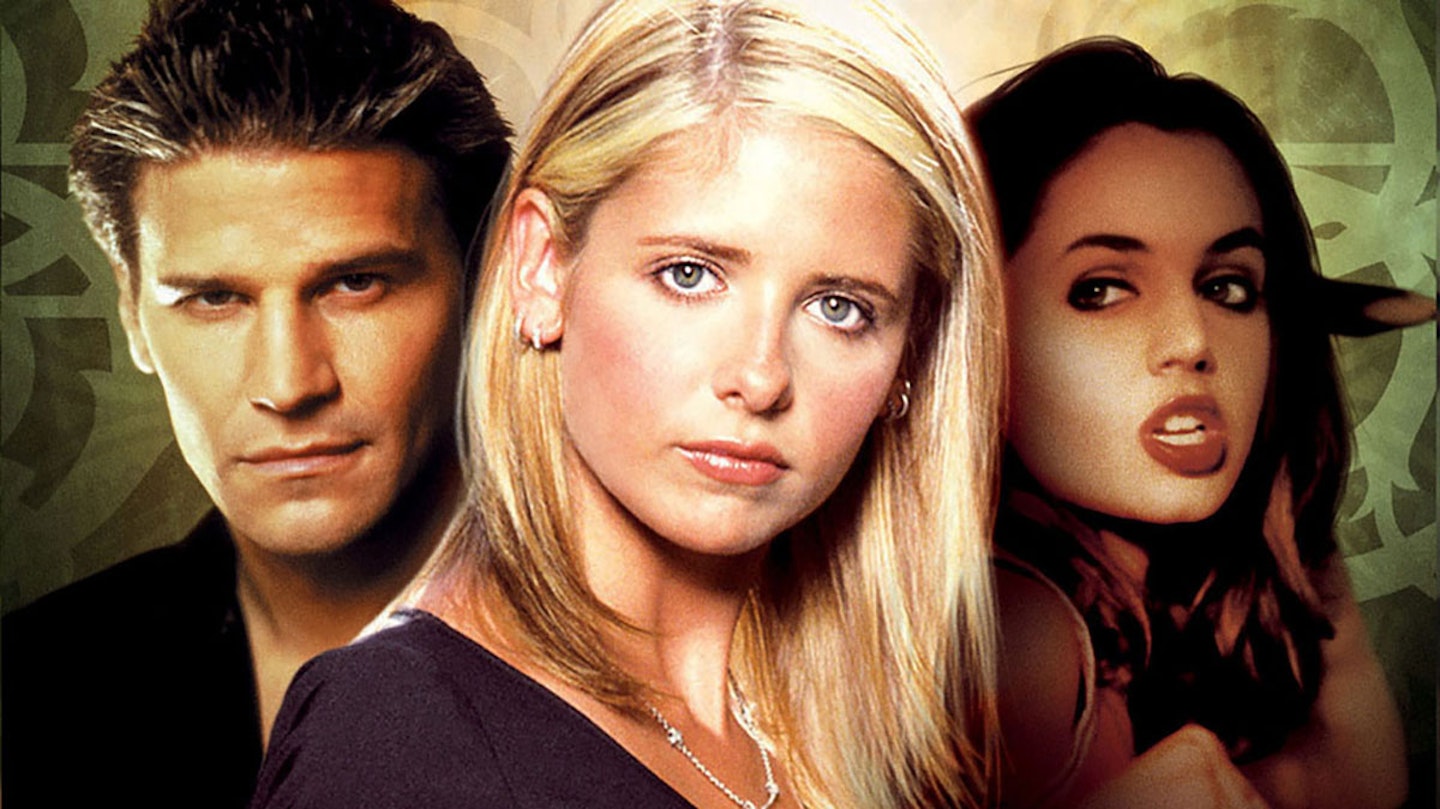
One, it proved that there was life after Romeo & Juliet. Our goal was to keep it fresh, which we did. And we got to explore Faith and the dark side of being a Slayer and calling that whole thing into question was really exciting and the point. And knowing that we had a countdown on high school stories when we’d only been in high school for two and a half years. There was discussion of whether we should be Saved By The Bell and they’re in high school forever, and the decision to have them graduate meant for the first time that we were going to get into some serious changes just in terms of the look and the feel. We also knew that Angel was going to be leaving. Knowing we had limited time to play up both high school and the Angel/Buffy romance sort of galvanized us and made us pull out all of our stops with what we could do.
Seasons Four And Five
Things were shaken up even more in the fourth season, not the least of which was because of the changing dichotomy of the show now that Angel was gone. The season introduced a new love interest for Buffy in the form of Riley Finn, and then there was the Initiative, a military force designed to capture and experiment on vampires and demons to see if they could be utilized as weapons. The big bad was the high tech Frankenstein’s monster-like Adam.
In season four, the loss of Angel actually made things easier, because it meant new places to go. What had become tough was wringing new changes out of that relationship. By season four we were into mission statements. What we said was this is the first year of college. The first year of college is about being able to do whatever the hell you want and completely losing yourself, trying on new identities and changing. Exploring sexuality, exploring freedom to screw your boyfriend all day long, which Buffy did do for a while.
In season five, Buffy suddenly had a teenage sister, Dawn. In truth, reality was altered to protect “The Key,” given the form of Dawn, and keep her away from the goddess Glory, who wanted to use her to destroy the world. Most significant about the season, of course, was that Buffy had sacrificed herself to stop Glory. The final shot of the season was the heroine’s tombstone, which read, “Buffy Summers. She saved the world. A lot.”
Our mission statement for season five was family. When you think you’ve moved on and grown up and moved out of the house and are living your life, family comes back. You realize that they’re always a part of your life. Also a very strong message with me is you make your own family, or sometimes it’s made for you by monks. So the introduction of Dawn, the death of Buffy’s mom, the meeting of Tara’s family — all of that stuff was very deliberate. We knew year one of college was freedom and not a lot of mom. But Kristine [Sutherland, who played Joyce Summers], luckily, was spending a year in Italy, so it was perfect. And we said, “Perfect, then you’ll come back and you’ll be very heavy in season five and then I’ll kill you.”
Seasons Six And Seven
Season six, easily the series’ most nihilistic, focused on the resurrection of Buffy through Willow’s magic, her difficulty in handling rebirth (having been snatched from heaven) and slowly allowing herself to be assimilated back into her own life. In between there was the aftermath of her relationship with Riley, and a truly bizarre sexual relationship that developed between she and Spike; as well as the death of Tara by being shot to death and Willow’s turn to the dark side — where she is revealed to be the big bad and comes damn close to destroying everything.
Okay, Buffy’s come back from the dead, so you have to deal with that in a big way. Season six was basically about, “Okay, we’re grownups.” We have no mentor, we have no mother, we have no parental figures. We’re dealing with marriage and alcoholism and a really abusive relationship. We’re dealing with someone who is practically suicidally depressed. It’s weird, but people didn’t respond to that so much. Also, the metaphor of sex has become very graphic and real.
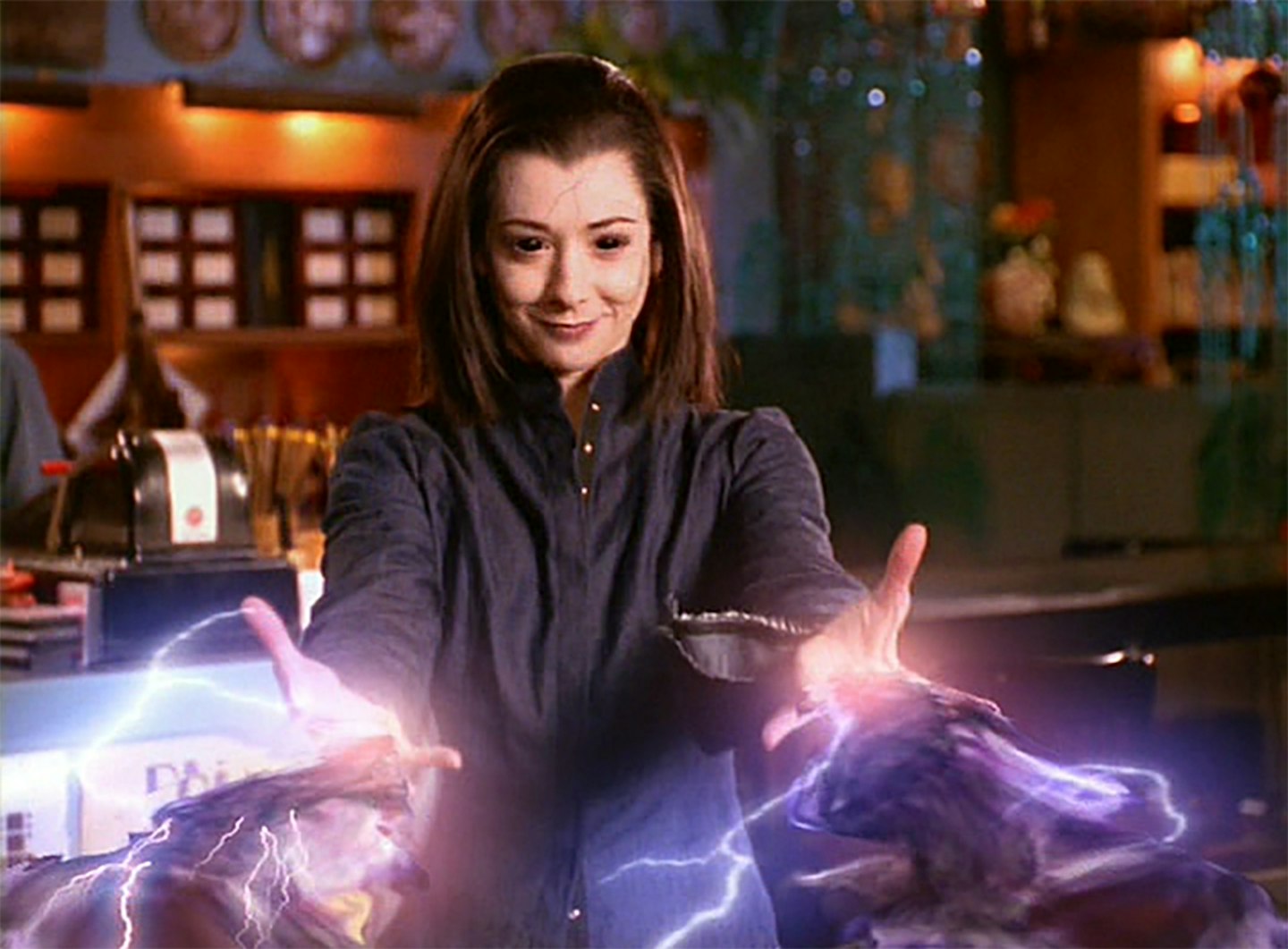
What were mystical demons have become three nerds with guns. Very real death, very mundane. The idea was to break down the mythic feeling of the show, because there is a moment at childhood when you no longer get that. Everything isn’t bigger than life; it’s actual size. It’s real loss. At the same time, there’s the darker side of power and Buffy’s guilt about her power and her feeling about coming back to the world. And her getting into a genuinely unhealthy relationship with Spike that was all about dominance, control and, ultimately, deep misogyny. How lost did we get? Well, our villain turned out to be Willow.
It all comes to an end in season seven with a return to basics and Buffy going up against the First (the ultimate evil), along the way dealing with a number of Slayers in training, the return of Faith and a genuine relationship with Spike who, like Angel, has been given his soul back.
We had a few things in mind with season seven. One, everybody was tired of being depressed, including us. Two, this was the last season. Three, let’s get back to where we started. Let’s go back to the beginning. Not the word, not the bang, but the real beginning. And the real beginning is girl power. The real beginning is what does it mean to be a Slayer? And not to feel guilty about the power, but having seen the dark side of it, to find the light again. To explore the idea of the Slayer fully and perhaps to see a very grown up and romantic and confusing relationship that isn’t about power, but is actually genuinely beautiful between two people in the form of Buffy and Spike.
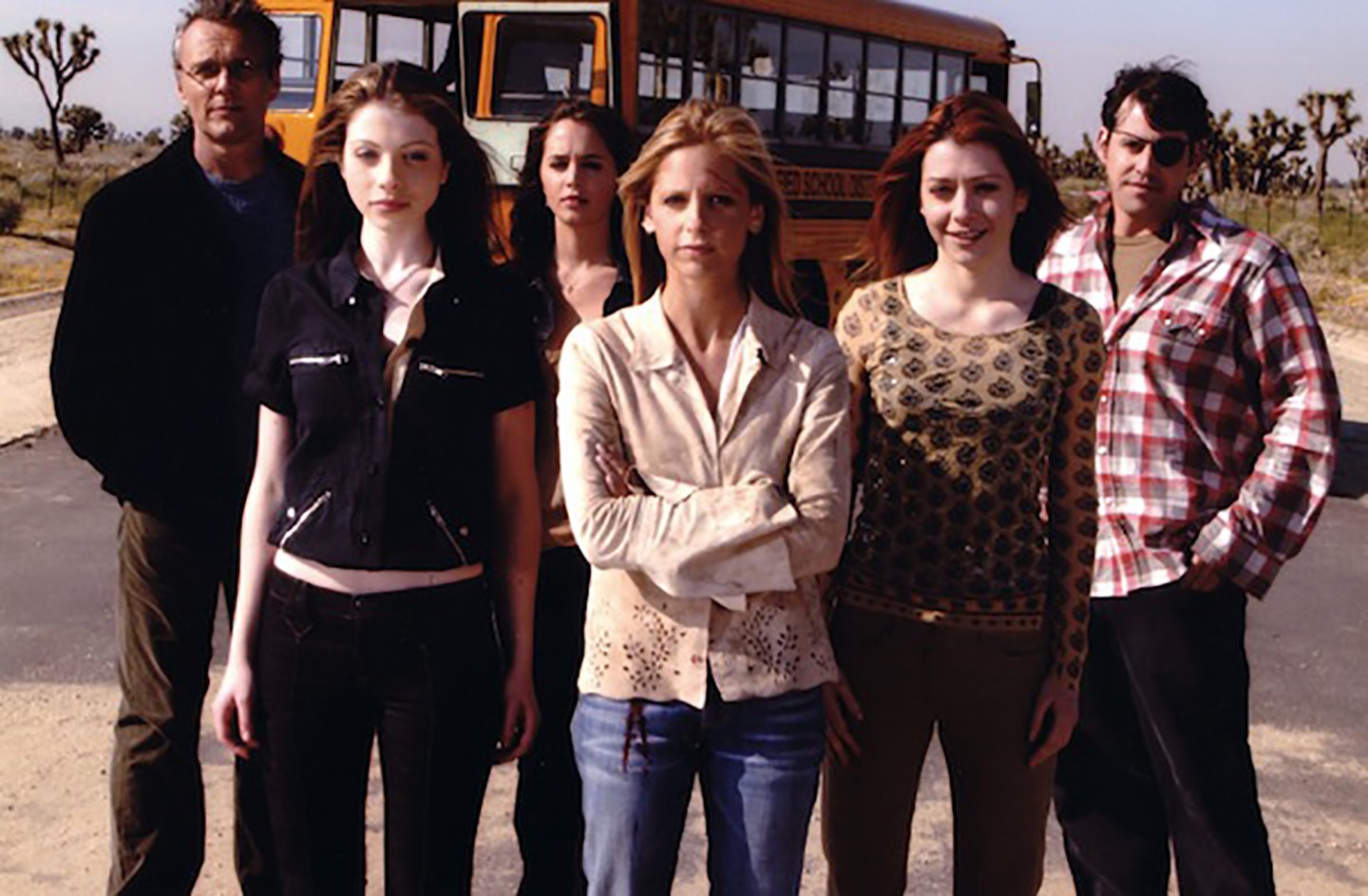
I feel that I wrote the perfect ending for the show and wrapped everything up exactly the way it should be. We wanted to hit the final chord of a beautiful symphony. That, unfortunately, was in season five. So with season seven, I sort of had to shut the door on the idea that this was the last episode a little bit, because the weight of that was crushing me. I was terrified. But I so very specifically knew what I needed to say and what I needed to have happen. That was all in there. But when you get into actually writing it, you’re just, like, “Oh, God, it’s not good enough.” Then you’re, like, “Dude, you’ve got to chill,” because it’s unbearable pressure. You want the last episode to mean something that no other episode has. And it is large. It was so hard to shoot. So we went out with a bang and hopefully an emotional one.
The Legacy
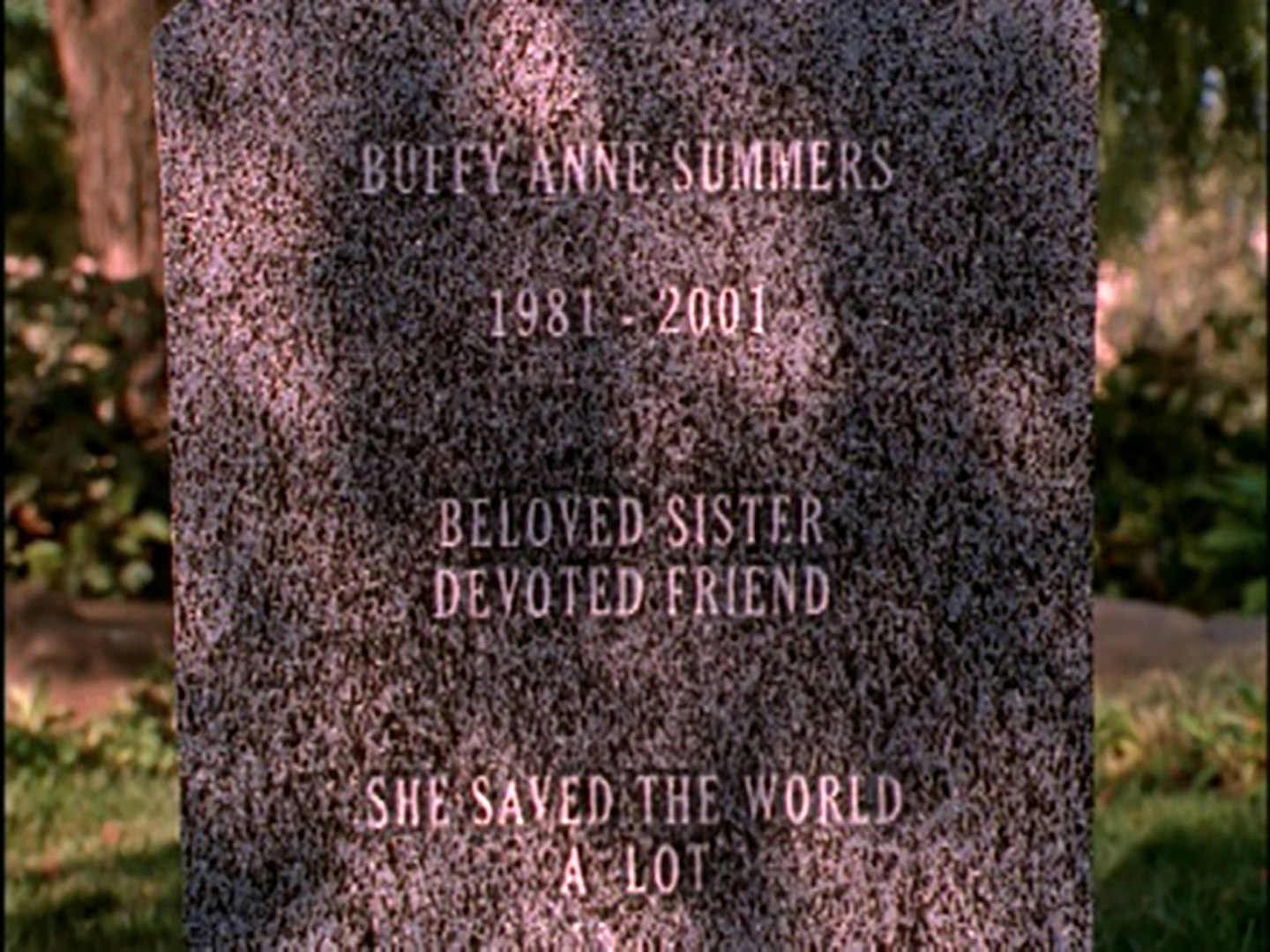
I want Buffy to be remembered as a consistently intelligent, funny, emotionally-involving show that subtly changed the entire world… or a small portion of pop culture. You know, enlightenment is the slowest process this side of evolution. It’s very hard to have come up in the 1970s, to be raised by a feminist and then through the Reagan era and then, God help us, two Bush eras. Feminism, which hopefully will become an obsolete term by the time I’m dead, is a really important thing. Changing the way people think about women and the way they think about themselves is what I want to do with my life. There are other stories I want to tell, but that’s the most important thing to me. If Buffy made the slightest notch in any of pop culture in that direction, well that’s pretty damn good.
